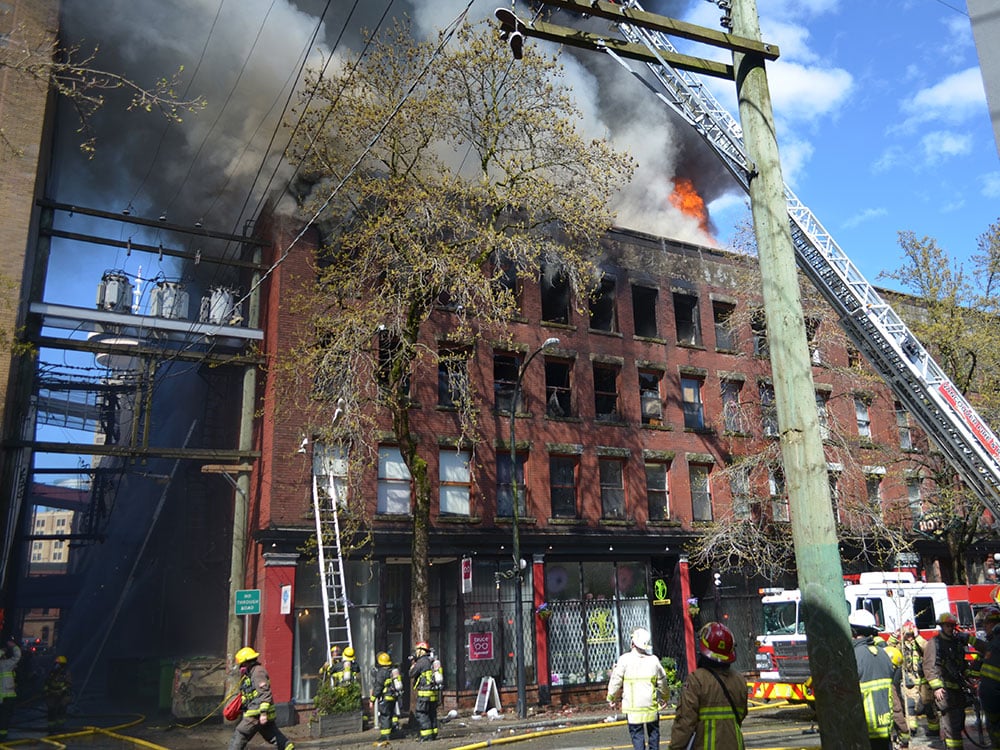On a sunny Monday morning in April, black smoke starts to billow out of an old four-storey brick building in Gastown. Soon, the entire neighbourhood is filled with foul-smelling smoke. On Abbott Street, the scene is chaotic: firefighters are rescuing people with ladders, flames are shooting out of the roof and shoeless residents huddle with their pets on the sidewalk.
The day after the fire, we were told that all the residents had been accounted for, and that the 107-year-old building — which housed 71 low-income tenants and seven small businesses — would have to be demolished. But 11 days later, as the building was being torn down, two bodies were found. It took weeks to officially identify them as two tenants of the Winters: 68-year-old Mary Ann Garlow and 53-year-old Dennis Guay.
Both were vulnerable people: Garlow was a residential school survivor who had lived in single-room occupancy hotels in the Downtown Eastside for decades, and was devoted to caring for her son, John. Guay was deaf and may not have been aware of how serious the fire was. The building was operated as supportive housing by an experienced housing provider, Atira Property Management, with funding from BC Housing.
It seemed important to find out what happened, so The Tyee spent a month talking to residents and business owners about what they experienced during the fire. We also spoke to family members of Garlow and Guay, who told us they wanted to know more about the fire suppression systems, how the fire started and whether it could have been prevented.
The building operator was ordered by the fire department to do a fire watch at the time of the fire because the sprinkler and alarm were not working because of a previous fire on April 8.
A fire watch entails regular patrols to monitor for fire, and building occupants are supposed to be notified. But it took us two months to gain confirmation from the fire department that such fire watch activities were actually happening.
In the meantime, 13 residents we spoke to said they hadn’t seen any fire watch patrols, hadn’t been told about the sprinklers not working and hadn’t seen notices posted. Four business owners also said they hadn’t been told about the fire watch; the fire department confirmed to The Tyee that the businesses should have been notified.
Residents also described a desperate search for fire extinguishers. One man described running through the building to get a fire extinguisher, but all the canisters he found were empty from fighting the previous fire.
The need for answers seemed obviously urgent. About 7,000 people live in SROs in Vancouver. They’re poor, vulnerable, often dealing with mental illness and substance use. The buildings — which provide small rooms and shared bathrooms and kitchens — are often old and poorly maintained.
And in 2021, there were 302 fires in SROs. Almost one a day.
If the Winters Hotel fire revealed gaps in fire safety, answering the questions could save lives.
When the Vancouver Fire Rescue Services investigation report was completed in June, The Tyee asked for a copy through a freedom of information request. The department said it would cost more than $200 to get a copy.
The Tyee paid, and the FOI clerk sent it over within a few days. The report included important information about how the fire started and dozens of photographs. It also confirmed that building residents and staff couldn’t find working fire extinguishers because many of them were empty from being used during the April 8 fire.
After reading the fire investigation report, The Tyee had two questions: Did Vancouver Fire Rescue Services investigate whether the fire watch was being done in the days and hours leading up to the fire? And why didn’t the fire department order the fire extinguishers to be replaced after the April 8 fire?
We sent our questions to Vancouver’s fire department on June 23. On June 28, we sent a reminder. On June 30, we got an emailed response — but it did not answer our two key questions. A followup email received no answer.
So at a press conference on the Vancouver Plan on July 5, we asked Vancouver’s mayor, Kennedy Stewart, if he could help us get answers to our questions.
On July 6, the fire department finally sent us those answers. They said the evidence, including video footage from a security camera in the building, showed that the fire watch was being done. The fire extinguishers were empty, used in the fire three days earlier. The department was due to perform an “after fire” inspection a few days after the April 8 fire, which would have identified any problems with the fire safety systems — alarms, sprinklers, fire extinguishers — in the building.
But the April 11 fire happened before that inspection could take place.
In that email, the fire department also said its staff are working with BC Housing and other single-room occupancy hotel operators to implement fire safety training.
“This correspondence will conclude our response towards the fire at 203 Abbott Street,” the email states.
The fire department has been extraordinarily busy this year, fighting an unusually high number of fires in the city.
But it shouldn’t be this hard to get answers to two basic questions about fire safety. Or about the specific steps being taken to prevent another deadly SRO fire. ![]()
Read more: Rights + Justice, Housing

















Tyee Commenting Guidelines
Comments that violate guidelines risk being deleted, and violations may result in a temporary or permanent user ban. Maintain the spirit of good conversation to stay in the discussion.
*Please note The Tyee is not a forum for spreading misinformation about COVID-19, denying its existence or minimizing its risk to public health.
Do:
Do not: